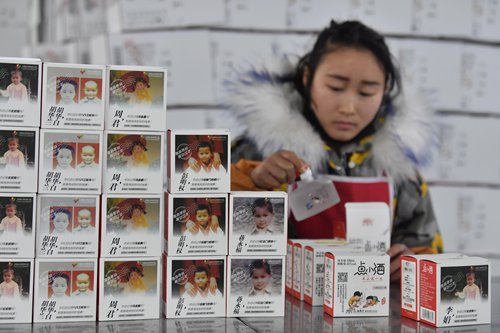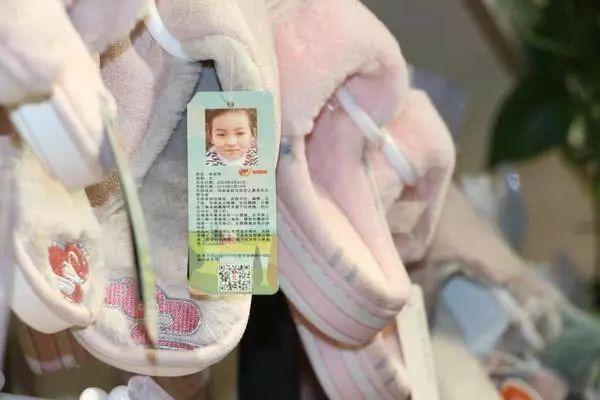
From the People's Daily App.
This is Story in the Story.
According to the Supreme People’s Court of China, 3,713 child trafficking cases from 2013 to 2016 were solved. And more than 42,000 people who sexually abused, trafficked, or tortured minors were prosecuted last year, an increase of 10 percent year-on-year.
A Chongqing alcohol company recently released more than 110,000 bottles of liquor containing information about lost children on the package in the hope of finding leads for their safe return to their families.
Chongqing-based Laoyuanzi printed the photos and names of 1,000 lost children, including information about their physical appearance such as a scar. The company's online store says it put the information on 114,949 bottles of its products
The promotion is part of the "Baby Back Home" program under the China Charities Aid Foundation for Children (CCAFC), a national public-raising foundation under the administration of China's Ministry of Civil Affairs.
"Children are said to be the hope of their families and the future of the country. But they are vulnerable. If there is something wrong with one child, it will harm one family.”
Today’s Story in the Story looks at how China has increased efforts in child protection services and the prevention of human trafficking.

A worker from a factory in Southwest China's Chongqing Municipality wraps bottles of wine with information on missing children on Thursday. (Photo: IC)
Over the past four years, Cai Lei has used the slippers he produces in Zhengzhou, Henan Province, in the battle against child trafficking.
"I saw a movie about child trafficking years ago, and I was determined to do something to help fight the crime," he said.
Since 2015, Cai has sold more than 8 million pairs of slippers with tags and bookmarks bearing the information of missing children in China.
More than a decade ago, Cai bumped into a child on a long-distance bus trip that he suspected was being trafficked. He called the police and pointed out the suspect to authorities. "I saw families that had lost children, and as a father, I knew how much pain they must have felt," he said. "I saw that child crying desperately in the arms of a strange man, and I thought it was abnormal, so I called the police."
After the incident, Cai decided to join the fight against child trafficking by volunteering at Baby Come Home, China's first nonprofit people finder website. He had worked in a Zhengzhou supermarket for years but had plans to start a business in the slipper trade.
In 2015, he came up with a novel idea-if the slippers he sold could reach thousands of families, why not put some information on or inside the slippers so that the customers could also help search for lost children?
Cai contacted the charity and the police department, and together they created a special tag bearing the children's information to be attached to the slippers. In the autumn of 2015, the slippers were delivered to Cai's customers.

A tag with the information of a missing child is attached to a pair of slippers sold by Cai Lei, a businessman in Zhengzhou, Henan province. (Photo: China Daily)
But at the beginning, the impact was minimal. "The wholesale vendors did not understand why I wanted to put tags on the slippers," he recalled. "Besides, the customers usually just cut the tags off and threw them away after they bought the slippers."
After a trial-and-error period, Cai replaced the tags with bookmarks that had contact information for the charity and volunteers who sift through the information reported by the customers.
Cai sells about 2 million pairs of slippers every year. Over the past four years, he has spent more than $115,200 on the markers. Each bookmark costs 0.1 yuan to make. "We also work with vendors," he said. "If they are willing to help promote the children's information, we give them bigger discounts."
Child trafficking is a thorny issue that worries many parents in China.
The country has stepped up efforts against child trafficking, with the Ministry of Public Security setting up a platform to report information on missing children. By June, the platform had made public close to 4,000 pieces of information and helped find 3,901 lost children.
However, Cai's efforts have also drawn criticism. Some critics disparaged his campaign as "nothing more than a marketing gimmick.”
"If my products are good quality, and if they can help find lost children, what is the problem?" he responded.
So far, more than 20 companies in Henan have contacted Cai, agreeing to join his fight against child trafficking by producing the bookmarks. "If society can focus more on child trafficking, there will be fewer crimes," he said. "Besides, technology is improving, making the chances better for lost children to return to their homes."
Cai said he hopes one day his slippers will no longer need to carry the tags or bookmarks.
(Produced by Nancy Yan Xu, Lance Crayon, Brian Lowe and Paris Yelu Xu. Music by: bensound.com. Text from Global Times and China Daily.)


